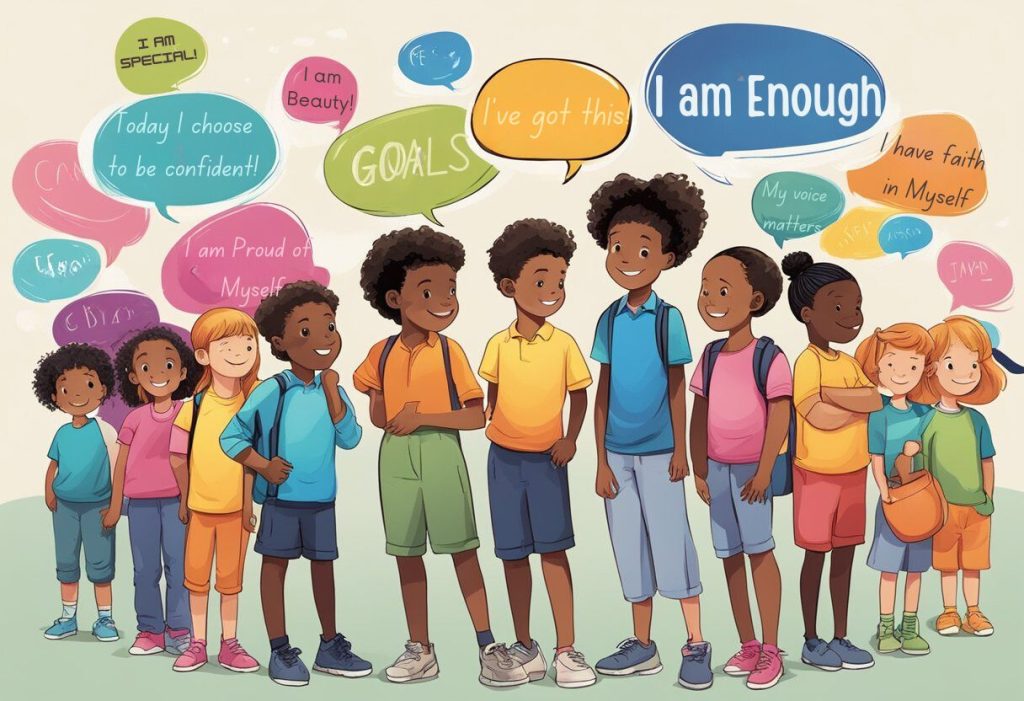How Positive Affirmations Can Transform a Growth Mindset in Children

Instilling Resilience through Empowering Words
In an era marked by rapid change and numerous challenges, it is essential to equip children with the tools they need to thrive. One of the most effective ways to achieve this is by cultivating a growth mindset, which is characterized by a belief in the ability to improve and learn through hard work and perseverance. At the core of this nurturing process are positive affirmations—simple yet impactful statements that can uplift children and establish a strong foundation for their self-confidence and resilience.
The Power of Positive Affirmations
Positive affirmations have been shown to significantly affect children’s emotional well-being and cognitive functioning. These affirmations can help children:
- Boost self-esteem: By affirming their value, children feel empowered to venture beyond their comfort zones. For instance, instead of fearing failure, a child might approach a new math problem with the mindset, “I have the skills to solve this, and if I can’t, I will find out how.”
- Enhance motivation: Encouraging a “can-do” attitude enables children to push through challenges. For example, a child preparing for a spelling test could tell themselves, “I am capable of learning these words. I just need to practice.”
- Reduce anxiety: Regularly practicing positive self-talk can diminish feelings of fear and uncertainty. A child facing a social situation might say, “I am friendly and can make new friends,” which can foster a sense of calm and confidence.
In Nigeria, children often encounter high educational demands and societal expectations that can weigh heavily on their self-esteem. By integrating affirmations into daily routines, such as morning gatherings or study sessions, guardians can create a nurturing environment. Instead of expressing defeat with “I can’t do this,” children can learn to assert, “I am learning and improving every day.” This shift in language can transform their approach to learning and challenges.
Language as a Tool for Empowerment
Language plays a powerful role in shaping children’s perceptions of themselves and their interactions with the world around them. By providing children with affirming and positive words, parents and educators can foster an atmosphere where they feel secure to take risks and explore their capabilities. Phrases like “You have the potential to achieve great things” or “Every effort you make brings you closer to your goals” can be transformative.
This supportive environment is vital, particularly for children who may face socio-economic challenges or cultural expectations that feel overwhelming. By encouraging positive language, families and schools can help ensure that every child knows they are valued and capable. An empowered child not only thrives academically but also learns to contribute positively to their communities, creating a ripple effect of resilience and positivity wherever they go.

Ultimately, by embracing the concept of positive affirmations and implementing them consistently within educational and family settings, we can help transform young minds in Nigeria. This change can lead to generations of confident, resilient individuals ready to face the challenges of tomorrow with courage and conviction.
SEE ALSO: Click here to read another article
The Influence of Positive Self-Talk on Learning
Positive affirmations can serve as a catalyst for developing a growth mindset in children, fueling their potential and fostering an environment conducive to learning and resilience. This concept, which hinges on the idea that abilities and intelligence can be developed through dedication and hard work, sets the stage for children to embrace challenges willingly. By embedding positive self-talk into their daily lives, children are encouraged to approach tasks with an optimistic attitude and a willingness to learn, making it easier for them to navigate educational obstacles.
Practical Applications of Affirmations in Daily Life
In practice, implementing positive affirmations doesn’t have to be complicated. Parents and educators can seamlessly incorporate them into various daily routines to enhance children’s confidence and adaptability. For example:
- Morning Routines: Starting the day with a positive affirmation such as, “Today, I will give my best effort,” can set a constructive tone for the day ahead.
- Homework Sessions: As children tackle difficult assignments, reminders like, “Mistakes are part of the learning process, and I can improve,” can help foster resilience when they encounter setbacks.
- Sports and Extracurricular Activities: Encouraging phrases like, “I am capable of mastering this skill with practice,” can boost confidence during competitive events or when trying something new.
In Nigeria, where children often confront high-stakes educational environments that can lead to stress and anxiety, the consistent use of affirmations can counteract negative self-talk. Instead of dwelling on fears of inadequacy, children can learn to view themselves as capable individuals who are on a journey of growth. This adaptation not only enhances their academic performance but also nurtures essential life skills.
The Role of Caregivers and Educators
The presence of supportive adults is crucial in this transformative process. Teachers and parents have a significant influence on children’s self-perception and growth mindset development. By reinforcing positive affirmations, these role models can help establish a culture of encouragement and empowerment. When educators, for instance, employ affirmations in the classroom, such as, “Your effort matters more than the outcome,” they validate individual learning journeys and inspire students to engage actively with their education.
Moreover, training parents and educators to recognize the value of affirmations can lead to an intergenerational shift in mindset. As children witness adults modeling positive self-talk, they are more likely to adopt similar habits, reinforcing a community-wide embrace of growth-oriented perspectives.
In essence, the integration of positive affirmations into children’s daily lives can effectively reshape their mindsets. By demonstrating the power of language and supporting them with consistent affirmations, we lay the groundwork for resilient and capable generations ready to meet life’s challenges head-on. The potential for transformation is immense, and with each encouraging word, we pave the way toward a brighter, more empowered future for Nigeria’s youth.
| Advantages of Positive Affirmations | Transformative Impact on Growth Mindset |
|---|---|
| Enhanced Self-Esteem | Positive affirmations help children recognize their strengths, leading to a significant boost in self-esteem. |
| Improved Resilience | Consistent use of affirmations fosters resilience, making children more adaptable when facing challenges. |
| Increased Motivation | When children affirm their abilities, they naturally feel more driven to achieve their goals. |
| Enhanced Focus | Affirmations help children concentrate better, enhancing their learning capacity and cognitive functions. |
The incorporation of positive affirmations into a child’s daily routine can lead to profound changes in how they perceive themselves and their abilities. By affirming positive thoughts, children not only increase their self-confidence but also develop a growth mindset, which is crucial for personal and academic success. Studies have shown that children who practice affirmations are less likely to succumb to negative self-talk and are more open to learning from mistakes, ultimately fostering a love for learning. Furthermore, this approach can create an environment where children feel safe to express themselves and embrace challenges as opportunities for growth, equipping them with skills that extend beyond childhood into adulthood.
SEE ALSO: Click here to read another article
Building Emotional Resilience Through Affirmations
Positive affirmations not only shape a child’s cognitive abilities but also play a pivotal role in building emotional resilience. This dual benefit aligns perfectly with the demands of today’s fast-paced and often challenging environments that children face, especially in developing countries like Nigeria. Children who regularly engage in positive self-talk are more likely to cope effectively with stress, adversity, and emotional challenges. They also cultivate a deeper understanding of their feelings and reactions, which is essential for emotional intelligence.
The Psychological Effects of Positive Affirmations
Research has shown that the practice of positive affirmations can significantly reduce anxiety and increase feelings of self-worth among children. For example, when a child states, “I am worthy of love and success,” it can lead to an improved self-image and greater sense of belonging in their social circles, including their school and family. This psychological uplift is crucial given the societal pressures many Nigerian children face, such as expectations to excel academically and socially.
Furthermore, such affirmations can prompt a shift in perspective regarding failure. Rather than seeing failure as a definitive end, children learn to view it as an opportunity for growth and learning. This not only instills a willingness to take risks but also promotes creativity and innovation—a necessity in today’s globalized economy. By embracing failures as learning opportunities, children become more adaptive thinkers, ready to face a world that is constantly evolving.
Creative Expression and Affirmations
Incorporating creative expression through art or writing can further enhance the benefits of positive affirmations. Children can create vision boards or write affirmations in their journals, allowing them to visualize their goals and dreams. For instance, a child may write, “I can achieve great things if I put in the effort,” and include clippings of future aspirations, such as university or a professional career. This tangible representation of their affirmations enhances their belief in their capabilities and provides a daily reminder of their potential.
- Artistic Workshops: Schools can implement workshops that blend art with affirmations, allowing children to express their thoughts and emotions creatively. This could include painting, collage-making, or digital art, reinforcing the idea that their dreams are valid and achievable.
- Written Reflections: Journaling activities can be incorporated into school curriculums, where children write down daily affirmations and reflect on their experiences. This practice not only consolidates their affirmations but also encourages self-reflection, fostering a greater understanding of their emotional states.
Moreover, engaging in group affirmation sessions in schools can further reinforce social bonds among peers. The collective experience of reciting affirmations fosters a sense of community, urging children to support one another in their aspirations. They learn that they are not alone in their journeys, significantly reducing feelings of isolation or inadequacy that can arise during their formative years.
Ultimately, positive affirmations can lead to a profound shift in how children perceive themselves and their capabilities. By fostering a culture of affirmation, communities can ensure that children not only embrace a growth mindset but also develop the emotional resilience required to thrive in an increasingly complex world. Through simple yet impactful practices, emotional and cognitive development can go hand in hand, creating a future generation that is empowered, adaptable, and ready to conquer any challenge.
LEARN MORE: This related article may interest you
Conclusion: The Power of Positive Affirmations
In conclusion, the practice of positive affirmations holds transformative potential for children, particularly in fostering a growth mindset that is adaptable to the challenges of the modern world. As evidenced in the discourse surrounding emotional resilience and psychological well-being, these simple yet powerful statements nurture self-esteem, encourage goal-oriented behavior, and cultivate a sense of belonging among peers. In the context of Nigeria, where children frequently navigate a landscape filled with academic and social pressures, the necessity of instilling a growth mindset cannot be overstated.
By actively promoting positive affirmations within educational settings and community spaces, we can equip children with not just the ability to cope but also to thrive. Integrating activities like group affirmation sessions, artistic expression, and reflection through journaling can create an enriching environment where self-worth and ambition flourish. As children learn to embrace success and failure alike as part of their journey, they build not only resilience but also innovation—essential skills for the future workforce.
Ultimately, the journey toward fostering a growth mindset through positive affirmations extends beyond individual change; it paves the way for a supportive community that values encouragement and collaboration. By championing positive self-dialogue, we open the doors for Nigerian children to emerge as confident, capable, and compassionate leaders equipped to face whatever challenges lie ahead.


